The Boston Tea Party is one of the most misunderstood signature events of the American Revolution. For starters, it wasn’t about high taxes. The following explains why, along with some other little-known facts.
1. The Boston Tea Party protested a corporate bailout.
The Boston Tea Party didn’t protest excessive taxation. It protested a corporate bailout that threatened small merchants in Boston.
For years the East India Company had to ship its tea to Britain and pay a commission, or tax, before selling it in the other colonies. In exchange, Parliament gave it a monopoly on tea.
The tax paid by the East India Company in Britain made its tea more expensive in America than tea smuggled in from Dutch traders. When the East India Company ran into financial trouble, Parliament gave it a special deal. The company could keep its monopoly and export tea directly to America without paying the tax in Britain. That made East India tea cheaper in America than Dutch imported tea.
The bailout also made small, independent tea merchants less competitive than the East India Company. And even though Parliament’s action reduced the price of tea, it established the principle that America was subject to British taxes. Hence the Boston Tea Party.
2. A famous artist tried to stop it.
John Singleton Copley, the artist who painted so many of the important people of the late 18th century, tried to work out a compromise with the Sons of Liberty. His father-in-law, an East India merchant, needed the tea.
At the Old South Meetinghouse on Nov. 30, 1773, Copley argued for unloading the tea and keeping it in a warehouse while the colonists pressed their case with the governor and the Crown.
He didn’t win his argument.
3. Rhode Island did it first.
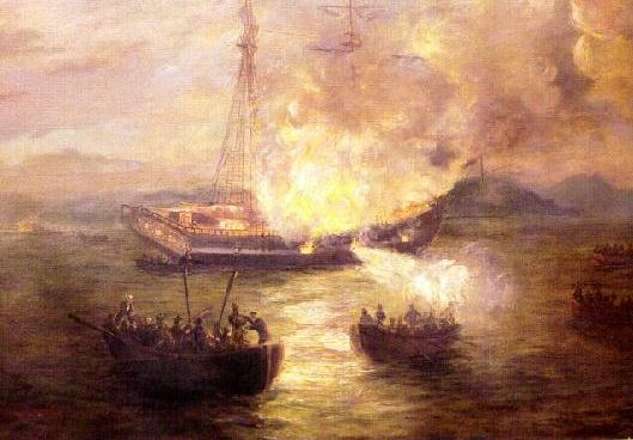
The Burning of the Gaspee by Charles deWolf Brownell, c1892
A year before the Boston Tea Party, Rhode Island staged its own maritime protest against import taxes in the Gaspee Affair.
The crew of the British customs schooner HMS Gaspee was aggressively boarding American ships in Narragansett Bay. They were searching for smuggled rum so they could collect the Sugar Tax. When the Gaspee ran aground, colonists led by John Brown and Abraham Whipple mustered 100 men to board longboats at night, capture the crew and burn the ship to the waterline.
And, like the Boston Tea Partiers, the perpetrators escaped punishment.
4. There was a fourth ship.
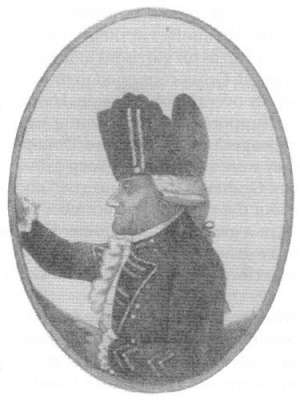
Caricature of Alexander Leslie
A fourth ship carried East India tea to Boston in addition to the Eleanor, the Beaver and the Dartmouth.
The vessel was shipwrecked on Cape Cod. Lt. Col. Alexander Leslie, stationed at Castle William in Boston, wrote about it to Lord Viscount Barrington in London:
The fourth vessel that brought the Tea is strand’d near to Cape Cod, but the Tea was got safe on Shore, and it’s expected by this time it has fared the same fate as the rest.
He got it partly right. Patriots, again dressed as Indians, destroyed several chests of tea. The other 50-odd chests made it back to Castle William, a fort in Boston Harbor (now Castle Island) where loyalists had holed up. The tea stayed there, safe until Aug. 8, 1775, when merchants — probably loyalist — bought it at auction. Boston by then was a loyalist city under siege.
5. Benjamin Edes forever kept the secret of the Boston Tea Party.
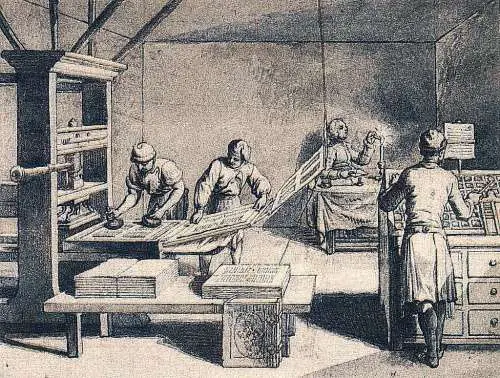
18th-century printing press.
Benjamin Edes, printer of the Boston Gazette, was considered the father of the Boston Tea Party. All of his life, he kept a list of participants locked in his desk drawer.
He went to his grave without revealing who participated. After he died, his widow gave the list to a Boston selectman named Benjamin Austin.
According to Edes’ son Peter, the list disappeared forever.
6. The British scapegoated a teenager for the Tea Party.
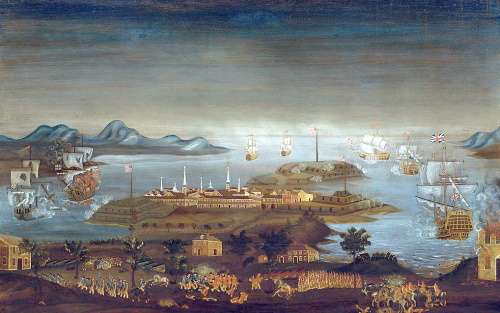
The Battle of Bunker Hill by Winthrop Chandler
Peter Edes was imprisoned for 3-1/2 months by the British – but technically not because of the Boston Tea Party. He had served punch to the Tea Partiers, who gathered at his father’s house on the night they dumped the tea in the harbor. He turned 17 the next day.
Eighteen months later, on June 17, 1775, the British noticed young Edes on Copps Hill cheering the patriots during the Battle of Bunker Hill. British regulars arrested him after searching his house and finding illegal firearms.
They probably punished him for the sins of his father. Peter Edes later went into the printing business himself, publishing the first newspaper in eastern Maine.
7. There were copycats all along the coast.
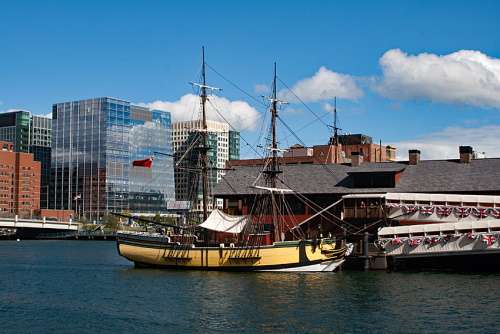
Replica of the Beaver in Boston Harbor.
At least half a dozen towns along the coast destroyed tea in their own versions of the Boston Tea Party.
In Greenwich and Princeton, N.J., and in Providence, patriots burned tea. In Annapolis, Md., they burned the whole ship.
New York and Philadelphia patriots turned back tea-carrying ships.
In Chestertown, Md., and Charleston, S.C., they dumped tea into the water and in York, Maine, they seized it.
This story was updated in 2023.
Images: Replica of the Beaver By Murgatroyd49 – Own work, CC BY-SA 4.0, https://commons.wikimedia.org/w/index.php?curid=84884221. Thanks to James R. Fichter in The Journal of the American Revolution, June 20, 2019, “The Tea That Survived the Boston Tea Party.”

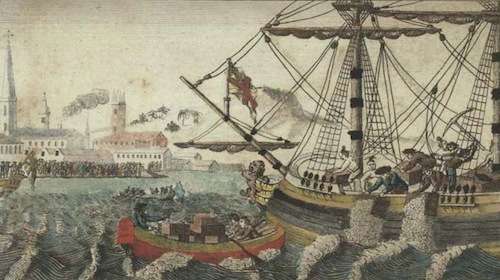


3 comments
[…] were losing the upper hand in dealing with rowdy Massachusetts colonists who had the prior year thrown a ship load of tea in the Boston harbor in protest of English […]
[…] years before the Boston Tea Party, outraged men launched a nighttime attack on a ship belonging to Andrew Belcher in Boston Harbor. […]
[…] decided to tax tea to discourage the Dutch from smuggling the stuff into the colonies – hence the Boston Tea Party. The Dutch were also the first to salute the American flag and, therefore, the first to acknowledge […]
Comments are closed.